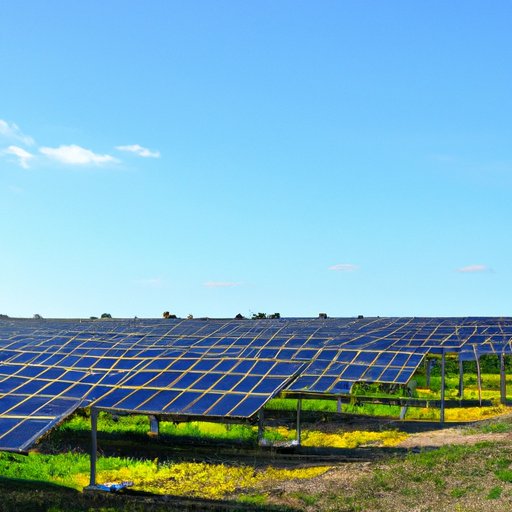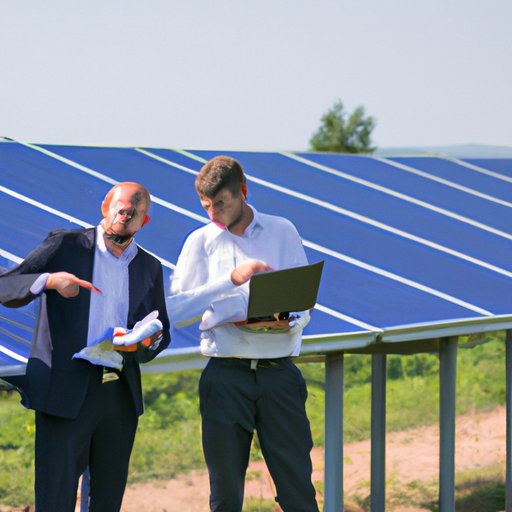Introduction
Starting a solar farm business is a great way to invest in renewable energy and take advantage of the increasing demand for clean and sustainable sources of electricity. This type of business requires a significant investment of time and money, but it also has the potential to provide a strong return on that investment. In this article, we’ll discuss what it takes to start a successful solar farm business, including researching local regulations, developing a business plan, and understanding the technical requirements of installing and operating a solar farm.

Definition of Solar Farm Business
A solar farm is a large-scale photovoltaic system (PV) used to generate electricity from the sun. The panels are typically arranged in rows and connected to an inverter, which converts the direct current (DC) electricity generated by the panels into alternating current (AC) electricity, which can be used to power homes and businesses. Solar farms can range in size from just a few acres to hundreds of acres, and they can be located either on land or on rooftops.

Benefits of Starting a Solar Farm Business
There are several benefits to starting a solar farm business. First, solar farms offer a reliable source of income. As long as there is sun, your solar farm will generate power and you will receive payments for the electricity it produces. Additionally, solar farms help reduce emissions and promote sustainability, making them attractive investments for many people. Finally, solar farms can be a great asset for communities, providing jobs, boosting local economies, and helping to reduce energy costs.

Identifying Potential Locations for Solar Farms
The first step in starting a solar farm business is identifying potential locations for the farm. You’ll need to consider factors such as the amount of available space, access to roads and utilities, and the amount of sunlight the location receives. Additionally, you’ll want to research local government regulations and permitting requirements to ensure that you can legally operate the solar farm in the area.
Researching Local Government Regulations and Permitting Requirements
Before you can begin building your solar farm, you’ll need to obtain the necessary permits and licenses from your local government. This process can be complex, so it’s important to thoroughly research the regulations and permitting requirements in your area. Additionally, you may need to hire a lawyer to help you navigate the process.
Determining the Best Location for a Solar Farm
Once you’ve identified potential locations for your solar farm, you’ll need to determine which one is the best choice. Factors such as access to roads and utilities, the amount of available land, and the amount of sunlight the location receives should all be taken into consideration. Additionally, you’ll want to make sure that the location meets all local government regulations and permitting requirements.
Developing a Business Plan and Financing Strategy
Once you’ve identified a potential location for your solar farm, you’ll need to develop a business plan and financing strategy. This involves establishing financial goals, creating a detailed business plan, and finding sources of financing. You’ll also need to calculate the costs associated with building and operating the solar farm. A professional accountant can help you develop a sound financial plan.
Establishing Financial Goals
The first step in developing a business plan and financing strategy is to establish your financial goals. Consider how much money you need to build and operate the solar farm, and what kind of return on investment you’re hoping to achieve. You’ll also want to factor in any tax incentives or other benefits you may be eligible for.
Creating a Detailed Business Plan
Once you’ve established your financial goals, you’ll need to create a detailed business plan. This should include information such as your target market, pricing strategies, marketing plans, and operational procedures. You’ll also want to include a timeline for when each step of the process should be completed.
Finding Sources of Financing
Once you have a detailed business plan in place, you’ll need to find sources of financing to cover the costs of building and operating the solar farm. This could include traditional loans, grants, or investments. Additionally, you may qualify for government incentives or tax credits. It’s important to understand the terms and conditions of any financing you receive, as well as any associated risks.

Investigating the Technical Requirements for Building and Operating a Solar Farm
In addition to the financial and business considerations, there are also several technical requirements for building and operating a solar farm. This includes researching available equipment and technology, calculating installation costs, and selecting installation methodology.
Researching Available Equipment and Technology
Before you can begin building your solar farm, you’ll need to research the available equipment and technology. You’ll need to choose the type of panels, inverters, and mounting systems that are best suited for your needs. Additionally, you’ll want to consider the cost, efficiency, and lifespan of the equipment you choose.
Calculating Installation Costs
Once you’ve chosen the equipment and technology, you’ll need to calculate the installation costs. This includes labor costs, materials, and any additional services that may be required. It’s important to get quotes from multiple contractors to ensure that you’re getting the best possible price.
Selecting Installation Methodology
Finally, you’ll need to decide on the best installation methodology for your solar farm. This includes factors such as the size of the system, the type of land it will be installed on, and the orientation of the panels. Additionally, you’ll want to consider the weather patterns in your area, as this can affect the efficiency of the system.
Conclusion
Starting a solar farm business can be a rewarding and profitable endeavor, but it requires careful research and planning. From researching local regulations and permit requirements to understanding the technical aspects of building and operating a solar farm, there are many things to consider. With the right approach and a little bit of hard work, you can launch a successful solar farm business.
(Note: Is this article not meeting your expectations? Do you have knowledge or insights to share? Unlock new opportunities and expand your reach by joining our authors team. Click Registration to join us and share your expertise with our readers.)
